Start from You and Me- Take Action to Protect Our Planet
Compiled from Supreme Master Television News
Recycling
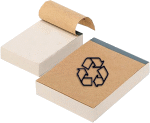 Here's a tip that can help prevent deforestation. When possible, we should try to use recycled paper. These days recycled products are easy to find. Many office supply stores and grocery stores stock recycled printing paper, envelopes, paper towels and toilet paper. You can also keep all paper that has only been printed on one side, bind it together using a strong clip, and use the other side. This makes a homemade notebook for jotting notes or a sketchbook for young children. Children can use it, and learn the value of recycling. So let's remember the 3 Rs: Reduce, Reuse, Recycle!
(Episode 174)
Here's a tip that can help prevent deforestation. When possible, we should try to use recycled paper. These days recycled products are easy to find. Many office supply stores and grocery stores stock recycled printing paper, envelopes, paper towels and toilet paper. You can also keep all paper that has only been printed on one side, bind it together using a strong clip, and use the other side. This makes a homemade notebook for jotting notes or a sketchbook for young children. Children can use it, and learn the value of recycling. So let's remember the 3 Rs: Reduce, Reuse, Recycle!
(Episode 174)
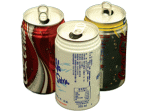 By simply recycling one aluminum drink can, enough energy can be saved to run a TV for three hours. That's amazing, so let's remember to reduce, recycle, and reuse. (Episode 194)
By simply recycling one aluminum drink can, enough energy can be saved to run a TV for three hours. That's amazing, so let's remember to reduce, recycle, and reuse. (Episode 194)
Save Energy
 When purchasing a new car, consider buying an energy-saving and low green house gas emission car.
When purchasing a new car, consider buying an energy-saving and low green house gas emission car.
Here is a useful tip that saves time and reduces traffic. If you coordinate your shopping trips with friends and neighbors, making one trip together to three or four stores on one outing rather than three or four separate trips, this not only saves time but also means that you will drive less. You'll earn a star for being environmental friendly that way!(Episode 128)
Car sharing is becoming popular in the United Kingdom. (Liftshare.com)People are using online services such as Liftshare.com and community centers, to find car sharing commuters. Car sharing reduces costs, reduces congestion and pollution, and improves access in areas with limited public transport. (Episode 159)
 The refrigerator is by far the single biggest consumer of electricity in the average household, responsible for 10-15 % of the electricity used each month. One can save energy by not setting the thermostat too high. Even one degree will make a big difference. Keep the refrigerator out of the sun and away from heating vents; also use the "energy saver" switch near the thermostat and clean the condenser coil. These tips would help save energy so we can be kinder to the environment. (Episode 172)
The refrigerator is by far the single biggest consumer of electricity in the average household, responsible for 10-15 % of the electricity used each month. One can save energy by not setting the thermostat too high. Even one degree will make a big difference. Keep the refrigerator out of the sun and away from heating vents; also use the "energy saver" switch near the thermostat and clean the condenser coil. These tips would help save energy so we can be kinder to the environment. (Episode 172)
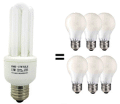 Consider replacing incandescent light bulbs with the more energy efficient and longer lasting compact fluorescent bulbs. According to research by Energy Star, if every American home replaced just one light bulb with a compact fluorescent bulb, we would save enough energy to light more than 2.5 million homes for a year and prevent greenhouse gases equivalent to the emissions of nearly 800,000 cars. (Episode 190)
Consider replacing incandescent light bulbs with the more energy efficient and longer lasting compact fluorescent bulbs. According to research by Energy Star, if every American home replaced just one light bulb with a compact fluorescent bulb, we would save enough energy to light more than 2.5 million homes for a year and prevent greenhouse gases equivalent to the emissions of nearly 800,000 cars. (Episode 190)
Consider how many light bulbs are in your home. Now imagine how much you would save if they were all energy-efficient. One such bulb uses less than ¼ of the electricity of a standard model and can last up to 12 times longer, bringing you significant savings on your electricity bills and ensuring a greener, cleaner environment. (Episode 157)
Conserve the Earth's Precious Resources
Did you know that you can reduce your water bill by up to 50 percent? Simply install low-flow showerheads and faucets and you'll use half the water without decreasing performance. Now you can turn your hot water heater down to 50°C (120°F) and see hot water costs go way down. You'll save money every month, and help conserve the earth's precious resources. (Episode 187)
 Take quick showers, it saves about 1/3 of the amount of water compared to a bath; and bathing uses the most hot water in the average household. A typical bath uses 15-25 gallons of hot water, while a 5-minute shower uses less than 10 gallons. (Episode 195)
Take quick showers, it saves about 1/3 of the amount of water compared to a bath; and bathing uses the most hot water in the average household. A typical bath uses 15-25 gallons of hot water, while a 5-minute shower uses less than 10 gallons. (Episode 195)
 Save with each cup of hot beverage. Just boil the amount of water you need for one cup, rather than boiling extra water that won't be used, thereby saving energy and money. (Episode 149)
Save with each cup of hot beverage. Just boil the amount of water you need for one cup, rather than boiling extra water that won't be used, thereby saving energy and money. (Episode 149)
 When cooking, match the size of the hot plate ring to the size of the saucepan. Also, put a lid on the saucepan so the contents will heat more quickly. (Episode 198)
When cooking, match the size of the hot plate ring to the size of the saucepan. Also, put a lid on the saucepan so the contents will heat more quickly. (Episode 198)
Refrain from opening it often to check if the food is ready. The heat will stay in, less energy will be used, and cooking time will be faster. You can also switch the oven off a few minutes before your meal is ready. The oven will stay hot enough to finish cooking the food, and you'll be saving energy for our planet.(Episode 156)
Conservation Tips for the Winter
With cold weather, we end up spending more on energy. One simple way for reducing your heating requirements in cold weather is to get some window wrap. This is a sheet of plastic that will keep cold drafts from flowing into a room from the outside. Make sure there are no curtains or furniture blocking the radiators - they will block the heat. And before turning up the heating, see if wearing a sweater or warmer layers of clothing can help. (Episode 151 and 165)
Tips for Washing Clothes
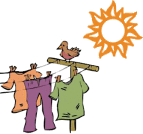 Wash laundry loads on the low-temperature program. Unless clothes are unusually dirty, the low temperature program will leave your clothes clean and fresh, and allows you to save energy, which reduces emissions and increases savings. (Episode 197)
Wash laundry loads on the low-temperature program. Unless clothes are unusually dirty, the low temperature program will leave your clothes clean and fresh, and allows you to save energy, which reduces emissions and increases savings. (Episode 197)
Instead of clothes dryers that use a lot of energy, why not use a drying rack or clothes line? In summer time, you will just love the scent of clothes dried in the great outdoors. In winter time, you can dry your clothes partially in a dryer, and then finish the job on a drying rack. The sun's rays are good for you. (Episode 183)
Keep Your House Clean and Safe
 Many household cleaners contain chemicals that are dangerous to the environment and to householders. Nowadays, many eco-friendly non-toxic alternatives exist, making your home safe for your family and pets. Pets in particular will benefit from non-toxic cleaners. (Episode 182)
Many household cleaners contain chemicals that are dangerous to the environment and to householders. Nowadays, many eco-friendly non-toxic alternatives exist, making your home safe for your family and pets. Pets in particular will benefit from non-toxic cleaners. (Episode 182)
Vinegar is an excellent cleaning agent against most germs, molds and bacteria strands. Keep a clean spray bottle filled with a mixture of 50 percent vinegar and water in your kitchen near the cutting board, and in your bathroom; use it for cleaning. The smell of the vinegar dissipates within a few moments and you have a fresh, germ-free home safe for you and the environment. It's even economical, too! Simple solutions can be so beautiful, don't you think? (Episode 146)
Lemon juice, vinegar and cream of tartar, also known as tartaric acid, are all inexpensive ingredients you might have in your kitchen pantry. They help remove tarnish and other corrosion from metals; they also remove hard water deposits, and discoloration and corrosion from metals. (Episode 130)
Baking soda is a common household item that can be put to good use as an environmentally friendly cleaning product. You can sprinkle it in your shower, bathtub or sink to help remove bathtub rings or deposits on the kitchen sink. If the stain is very tough to remove, you can make a paste of the baking soda and allow it to stand on the stain for 10 to 20 minutes before washing off. (Episode 121)
Reduce Land Pollution

By using rechargeable batteries instead of disposables, you will save money and reduce land pollution in the long term. And if you want to help the environment further you can buy solar powered battery recharges. Sun energy is free to all of us.(Episode 135)
Use Reusable Containers
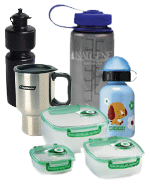 Even though there are some good quality bottled water industries that use biodegradable water bottles, you still can't beat filtered tap water in a reusable bottle or cup. To save on packaging the same goes for other widely-consumed beverages, like coffee and tea. Reusable bottles and mug-flasks are becoming widely available in different sizes, shapes and colors. It should be easy to find one that's just right for you. (Episode 185)
Even though there are some good quality bottled water industries that use biodegradable water bottles, you still can't beat filtered tap water in a reusable bottle or cup. To save on packaging the same goes for other widely-consumed beverages, like coffee and tea. Reusable bottles and mug-flasks are becoming widely available in different sizes, shapes and colors. It should be easy to find one that's just right for you. (Episode 185)
Use reusable food containers for leftovers and lunches. By doing this, you'll eventually be saving miles of plastic wrap and plastic bags. Furthermore, why not use the reusable versions of shopping bags? (Episode 193)